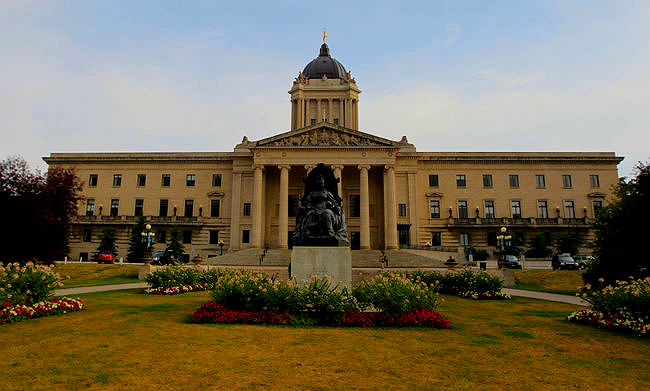This article does not argue for or against the Manitoba government’s recent hike of the Provincial Sales Tax (PST). So if you’re after fodder to back up your particular ideological fancy, contact your local lefty blog or the Winnipeg Sun, depending on your preferred brand ‘o brew. This article argues for good arguments either for or against the PST hike. The best way to do this is interrogating the hell out of the many bad ones out there. Hold onto your butts – here we go:
Versus the bleeding heart social democrats
These folks support the PST hike because “ya gotta do what ya gotta do” to help the poor. If our government has to increase the tax for ‘tobans to improve social services and infrastructure that is accessible to all regardless of socioeconomic status, then so be it. Those comfortable, upper-middle-class, Ikea-loving, Winnipeg-Jets-license-plate-
Now before ye bleedin’ heart social democrats march on the Leg building, this ain’t Mr. Selinger harbouring a secret vendetta against poor people. He, like every other Premier in Canada, is in a very tough spot. The province needs a revenue stream, but this country’s constitution gives most of the tax powers to the federal government, leaving the provinces to employ other creative tactics like Crown corporations or, you got it, a sales tax, to make money. So if you really want to get at the issue, get the feds to funnel down more cash to the provinces (‘coz, you know, Harper loves doin’ that), or go change the constitution. But be careful- opening the constitution in Canada makes opening Pandora’s box look like a children’s birthday party. Just check out the Charlottetown and Meech Lake Accords.
Versus the hypocritical hipsters
Oh you fashionably-unfashionable, counter-counter cultural, apolitically-political people. The causes you support all require government funding. Sure, the market can provide locally roasted coffee and apricot-flavoured beer, but no business will solve Aboriginal poverty, child hunger, and a rampant murder rate. So as you’re sipping your hopsy ale in Osborne or the Exchange, chatting about how government is a patriarchal power structure that should be replaced by your friendly neighbourhood non-profit, the causes you self righteously support (elimination of poverty, integration of immigrants into the work force, gender equality, etc.) are all collective action problems that society needs to address together, which requires – you got it – government. Even if non-profits do most of the work (an interesting option), they’ll require government funding. And how does government get money? Among other things, taxes. So don’t simultaneously proclaim your support for these causes while characterizing a tax hike as a somehow authoritarian move meant to keep the masses down. Given that you’re spending five bucks on a latte, you probably shouldn’t be speaking for the masses anyway.
Versus the bleeding heart we-shoulda-had-a-referendum crew
This group is perhaps the best-intentioned-but-most-
Death is inevitable, but taxes are only inevitable if a government demands it of its populace. Governments don’t ask nicely because doing so simply won’t yield enough funds to solve whatever the collective action problems happen to be. So for those lamenting the lack of a referendum, redirect your efforts at whether or not this is a necessary or just tax. Remember, the key referendum occurs when you vote a party in or out. Once in, it’s up to them as the governing body to, well, govern. If they had to ask nicely for revenue to fund such governing precious little would get done.
Versus the we don’t know and we don’t care crew
You lot are the worst. If you live in this province and you don’t know that your government is extracting one percent more than it used to for every purchase made, then you have little to no right to complain about anything the government does or doesn’t do. Enjoy your ignorance, but remember that it’s only bliss when things go smoothly.
__
Johanu Botha is a student of public policy and political philosophy. His hobbies include the mandolin and intermittent bouts of existential angst. You can reach him at johanu.botha@mail.mcgill.ca
